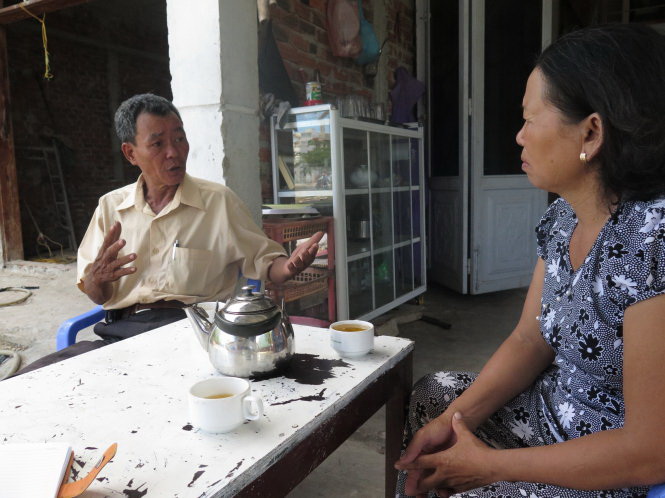Many survivors were forced through a traumatic, deprived childhood as orphans after their loved ones were killed in the massacre of Vietnamese civilians by South Korean mercenaries during the American war in Vietnam half a century ago.
>> Vietnamese survivors of S.Korean massacre – P1: Lifelong pains
Among the victims, Doan Ngoc Kim, 60, escaped with his life from the 1968 massacre carried out by South Korean troops in Duy Trinh Commune, Duy Xuyen District, located in the central province of Quang Nam.
After several attempts, he finally arranged a meeting with Nguyen Thi Thanh, 56, a resident in Dien An Commune in the province’s Dien Ban District.
Kim and Thanh each lost five family members to the mass slaughter by South Korean troops in 1968.
The two solemnly bonded like old friends, showing deep empathy for the suffering each had lived through.
Kim vividly remembers the appalling morning on which the South Korean patrol troops shoved him, his relatives, and his neighbors into a secret tunnel before hurling grenades through the entrance.
“I thought my dad was alive after my mom and all my siblings had been killed. A neighbor then broke the news to me that my dad was also gone,” he recounted in tears. At that moment, the 12-year-old boy realized he had become an orphan.
Thanh recounted that her cottage was bombarded with shellfire that seemed to come from nowhere on a morning that started out just like every other.
Her relatives fell dead and her four-year-old brother gasped for air before collapsing in a pool of his own blood.
Thanh herself was hit in her front abdomen while her eldest brother, 15, had his leg ripped apart by a bullet.
The boy took his sister across a field riddled with bodies lying.
“I took sips of water, which left my intestine protruding from my stomach. Fortunately help arrived. They carried my brother away while I fainted before my uncle found me,” Thanh said. She was only eight year old when the event took place.
After that gruesome morning, she was sent to the central city of Da Nang for treatment for nearly two years.
Her brother did not return to their hometown until 10 years later, as he was taken from one hospital to another for treatment for his critical injuries.
During that time of crisis, Thanh spent much time crying for her mother, unaware that her mom was among the corpses she had spotted in the field.
“My grandma kept making excuses for my mom’s failure to visit me at the hospital. Her grave was overgrown with grass when I visited it in belated tribute,” Thanh added.

Some former South Korean “comfort women,” who had been forced into sexual slavery by the Imperial Japanese Army in occupied territories before and during World War II, welcomed Nguyen Thi Thanh with flowers during her trip to South Korea in 2015. Courtesy of Nguyen Thi Thanh
The haggard-looking woman, who had not finished elementary school, began work as a domestic helper at a tender age and then as a farmer when she became an adult.
“There were times when I was on the verge of succumbing to overwhelming hardship.”
After the American war in Vietnam ended in 1975, Thanh married a man, also an orphan, in her neighborhood.
Kim, who had also been orphaned by the South Korean massacres, was brought up by his poor uncle. He roamed to Hanoi and some other parts of the country before being drafted into the army in 1977.
The man left the battlefield in Cambodia more than four years later with minor wounds.
“My body bears the historic scars of two wars. One is a piece of iron on the arm, while the other is in the abdomen,” he pondered.
“I can’t understand until now why a soldier could ruthlessly gun down an unarmed civilian.”
Things had almost fallen into oblivion when a group of South Korean students visited her for her accounts in 2015.
She and Nguyen Tan Lan, another survivor of the notorious mass slaughter, were later invited to the East Asian country to have their voices and stories heard.
“On the day of my talk, more than 500 veterans in uniform carried banners to reject their involvement in the mass killings,” Thanh said.
A number of local women and some righteous veterans, however, consoled her and extended a heartfelt apology.
“They visited my homes and burned joss sticks while kneeling at my mom’s altar. They were seeking forgiveness,” Thanh said.
Kim stressed that his greatest wish before death is the deserving recognition for the massacres.
He also hopes his parents’ and siblings’ graves will be cemented and better tended to. Meanwhile, Thanh ponders whether the massacres will be mentioned after she and other witnesses and victims pass away.
“The Korean students and women kept saying they are sorry, but an official apology from South Korea has yet to be made,” Thanh noted.
Like us on Facebook or follow us on Twitter to get the latest news about Vietnam!





















































